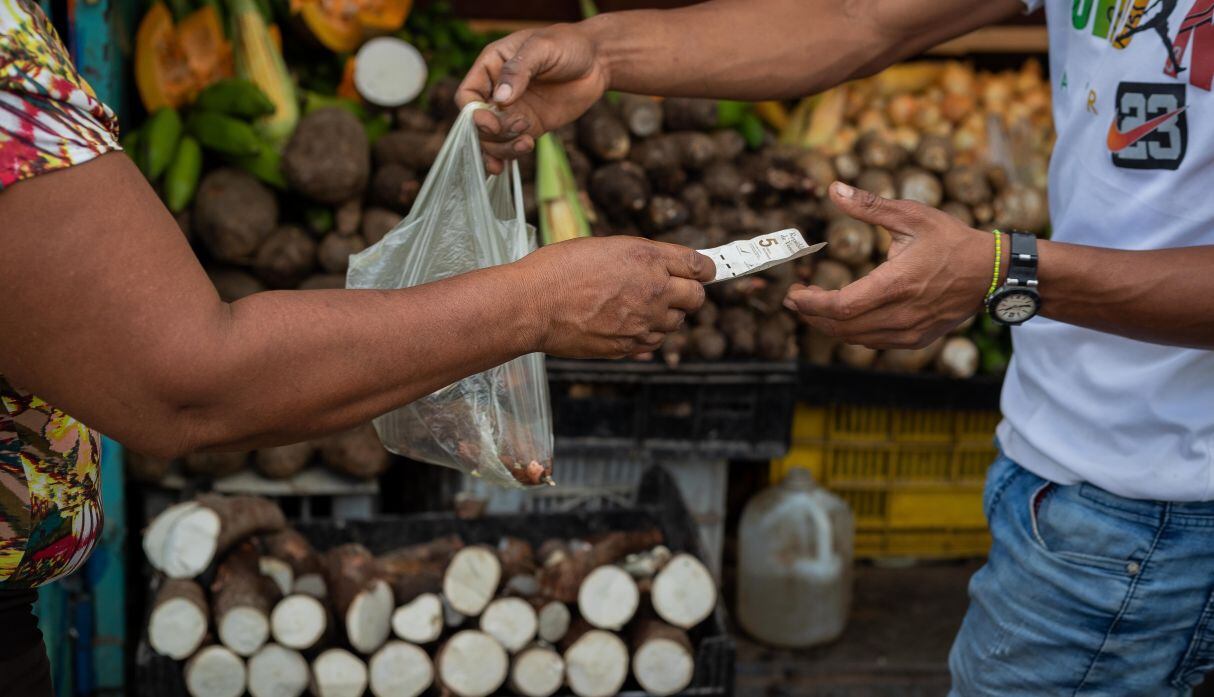
The inflation in Venezuelawhich in June fell to 1%, has slowed down as a result of a policy to stabilize the price of the dollar – the currency used in the country to price goods and services – for which they have also “sacrificed” wages and bank loans, experts warn.
The Executive assures that this is one of the “positive results” of a program launched in 2018 – when the country was experiencing hyperinflation – which led to a reduction in the increase in prices of 130.060% that year to a 189.8% in 2023.
Although President Nicolás Maduro assured that June inflation is the lowest in the country for 39 years, the history of the Central Bank of Venezuela (BCV) reflects that, in July 2012, there was also a 1%, While in March and April of the same year, inflation was 0.9% and 0.8%respectively.
The chief economist of the firm Ecoanalítica, Luis Bárcenas, told EFE that the authorities achieved greater stability in the price of the dollar through a “aggressive” sale of foreign currency, the vast majority of which comes from income obtained from oil exports.
Between January and May of this year, more than US$350 million per month were sold on average through banks, according to calculations by Ecoanalítica.
In this way, the expert explained, “floods” of foreign exchange in the domestic market to generate an oversupply of the US currency.
According to BCV, the price of the dollar went from 35.9 bolivars to 36.4 in the first half of 2024, an increase of 1.3%while in the same period of 2023, the currency rose from 17.4 bolivars to 27.8, an increase of 59.7%
The other side of politics
The anti-inflation strategy also contemplates keeping the issuance of bolivars at bay and, in this sense, Bárcenas indicated that the “first sacrificed” It is the minimum wage – a reference for the rest of the remunerations in the public sector – and pensions, at 130 bolivars since March 2022, which since then went from about 30 dollars to 3.5 today.
He pointed out that, despite migration, estimated at some 7.77 million Venezuelans by the Interagency Coordination Platform for Refugees and Migrants (R4V) – a figure that the Government reduces to less than 2.5 million – there is still “The size of the State is so large in terms of personnel and dependents” whatand “any salary adjustment would cause fiscal expenditure to increase significantly from one month to the next.”
Therefore, Bárcenas considers that a policy was developed “at the expense of the Venezuelan pocket”, who has also been affected by the credit restriction.
The slowdown -he continued- also responds to the “diminished“purchasing power, because while “a sector of the population” have “still a restricted consumption” and prioritize your spending, mainly, on food, the prices of goods and services will remain “relatively stable”.
For its part, the Venezuelan Finance Observatory (OVF), an autonomous entity made up of economic experts, also assures that the deceleration of inflation responds to the greater stability in the exchange market and to the “wage restraint”” applied by the Government.
A “fragile” stability
Bárcenas asserted that today Venezuela depends “more than ever of oil” to maintain this exchange rate stability, with factors that can play against it, such as the US sanctions, resumed in April after six months of relief, which “they limit sales (of crude oil) in the international market.”
Furthermore, this stability is subject to global events that have an impact on the energy sector, such as a conflict or lower consumption by large economies, which “causes the price of oil to fall” and, consequently, the country’s income decreases, with the risk of facing a “shortage of foreign exchange”.
“All this tranquility in terms of exchange rates (…) can be lost if, at a given moment, the economy begins to face problems in the generation of foreign currency”said the economist. Authorities expect that Venezuela, which experienced a hyperinflationary process between 2017 and 2021, will close 2024 with inflation lower than fifty%.
It may interest you
- Venezuela stands out in the Copa America and gives hope amid the political crisis
- Inflation expectations: what is expected for this indicator in 12 months?
- “Why don’t they give me likes?”: Maduro reinvents himself to leave behind his image as a despot
Source: Gestion
Ricardo is a renowned author and journalist, known for his exceptional writing on top-news stories. He currently works as a writer at the 247 News Agency, where he is known for his ability to deliver breaking news and insightful analysis on the most pressing issues of the day.












